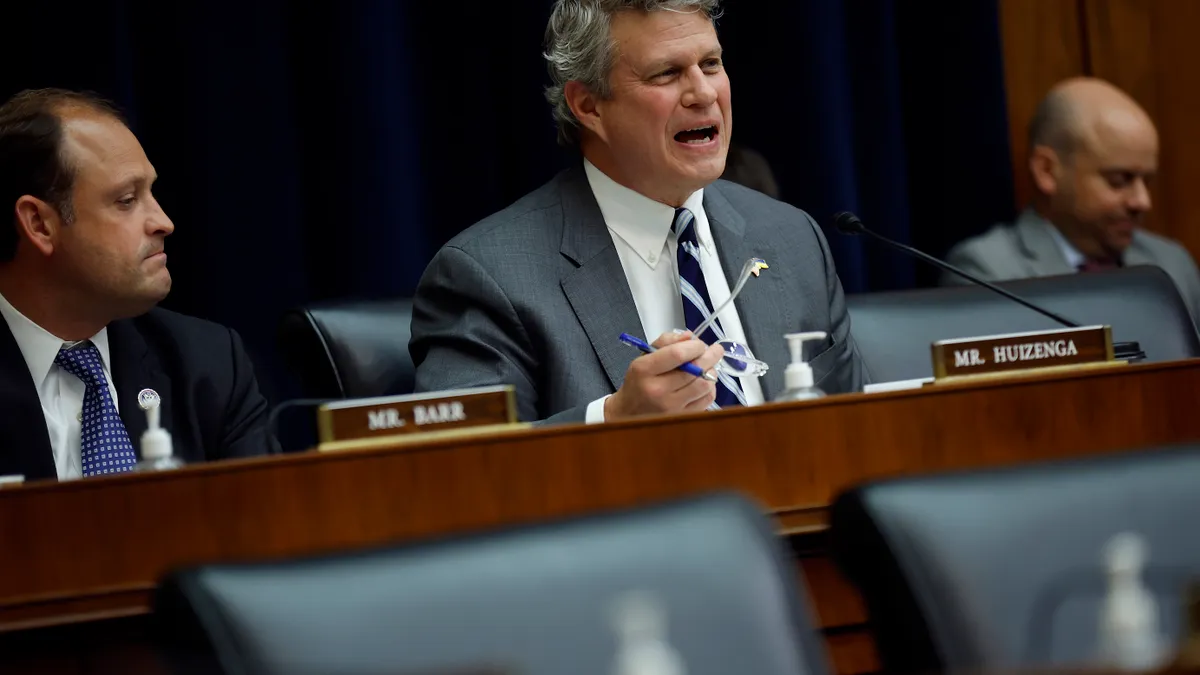Republican ire is spooling up over what digital payments company PayPal called an error in the post of a user policy that threatened to debit users’ accounts if they shared ”misinformation.”
A group of Republicans, including two ranking committee members, sent a letter Tuesday to PayPal CEO Dan Schulman asking for more information on the matter and thanking him for information provided in an Oct. 11 “briefing.” The Republican authors of the letter included the ranking member of the House Financial Services Committee, Rep. Patrick McHenry (R-NC), and the ranking member of the House Energy and Commerce Committee, Rep. Cathy McMorris Rodgers (R-WA).
“Thank you for the briefing provided to Minority staff of the House Committees on Energy and Commerce and Financial Services (the Committees) on October 11, 2022,” the Tuesday letter to Schulman said. “As a follow-up to the briefing, we write to request more information on the changes made to PayPal’s Acceptable Use Policy (AUP).”
A spokesperson for San Jose-based PayPal declined to comment on the letter, or the reference to a briefing. A spokesperson for Rep. Tom Emmer (R-MN), who provided the letter in a Tuesday press release, declined to comment on the briefing, referring that question to the House Financial Services Committee Staff. A spokesperson for the committee didn't immediately comment. Emmer is the ranking Republican on the House Financial Services subcommittee on oversight and investigations.
The former version of the PayPal Acceptable Use Policy sparked controversy this month because it included a provision that barred “sending, posting, or publication of any messages, content, or materials that, in PayPal’s sole discretion” promote “misinformation.” Any user that violated this provision, among others, could be subject to “liquidated damages” of $2,500, the policy said.
Former PayPal president weighs in
That updated version of the policy was to take effect on Nov. 3, but was rescinded after it triggered widespread media coverage and negative commentary from some politicians and high-profile figures, including a Twitter post from former PayPal President David Marcus.
U.S. Senator Tim Scott (R-SC) issued a press release on Oct. 12, saying: “I was gravely concerned by the recently reported updates to PayPal, Inc.’s Acceptable Use Policy (AUP) that would provide the firm carte blanche authority to levy financial penalties against users it determines have violated poorly-defined anti-‘misinformation’ policies.”
Last week, PayPal Spokesperson Justin Higgs told the Washington Post by email that the updated user agreement “included incorrect information related to company policy.”
Higgs also said this in that report: “PayPal is not fining people for misinformation and this language was never intended to be inserted in our policy. Our teams have made appropriate updates to correct these inaccuracies and we apologize for any confusion this has caused.”
He countered the notion that the terms were new, saying the company’s user agreement “has long-stated that PayPal can take funds of up to $2,500 or local equivalent from an account for each violation of the Acceptable Use Policy.”
‘Liquidated damages’ of $2,500
A post of the company’s current AUP, which says it was last updated on Sept. 20, 2021, states that infractions “may subject you to damages, including liquidated damages of $2,500.00 U.S. dollars per violation, which may be debited directly from your PayPal account(s) as outlined in the User Agreement.”
In the Republicans’ letter this week, they demanded that PayPal answer a litany of questions about the policy and its posting. They also said the company should provide a report after an internal company review of the matter.
“As a leading financial technology company, it is concerning that a user agreement that contemplates the restriction of free speech was uploaded and disseminated to PayPal users — even if in error,” the letter said. “We understand your company is currently investigating this matter. Upon the conclusion of your investigation, we request that you provide a briefing for the Committees as soon as practicable.”
Some of the Republican Congress members’ questions included “What is PayPal’s approval process for changes made to the AUP?” “Are there PayPal guidelines that document this process?” and “With respect to violations of the AUP, is a fined individual notified with specificity?”
The Congress members asked PayPal for responses no later than Oct. 27.
PayPal isn’t new to such political pressure. Congressional Democrats last year pushed PayPal to ban users peddling COVID-19 misinformation and to “stop people from profiting off their dangerous lies,” the Post reported.



















